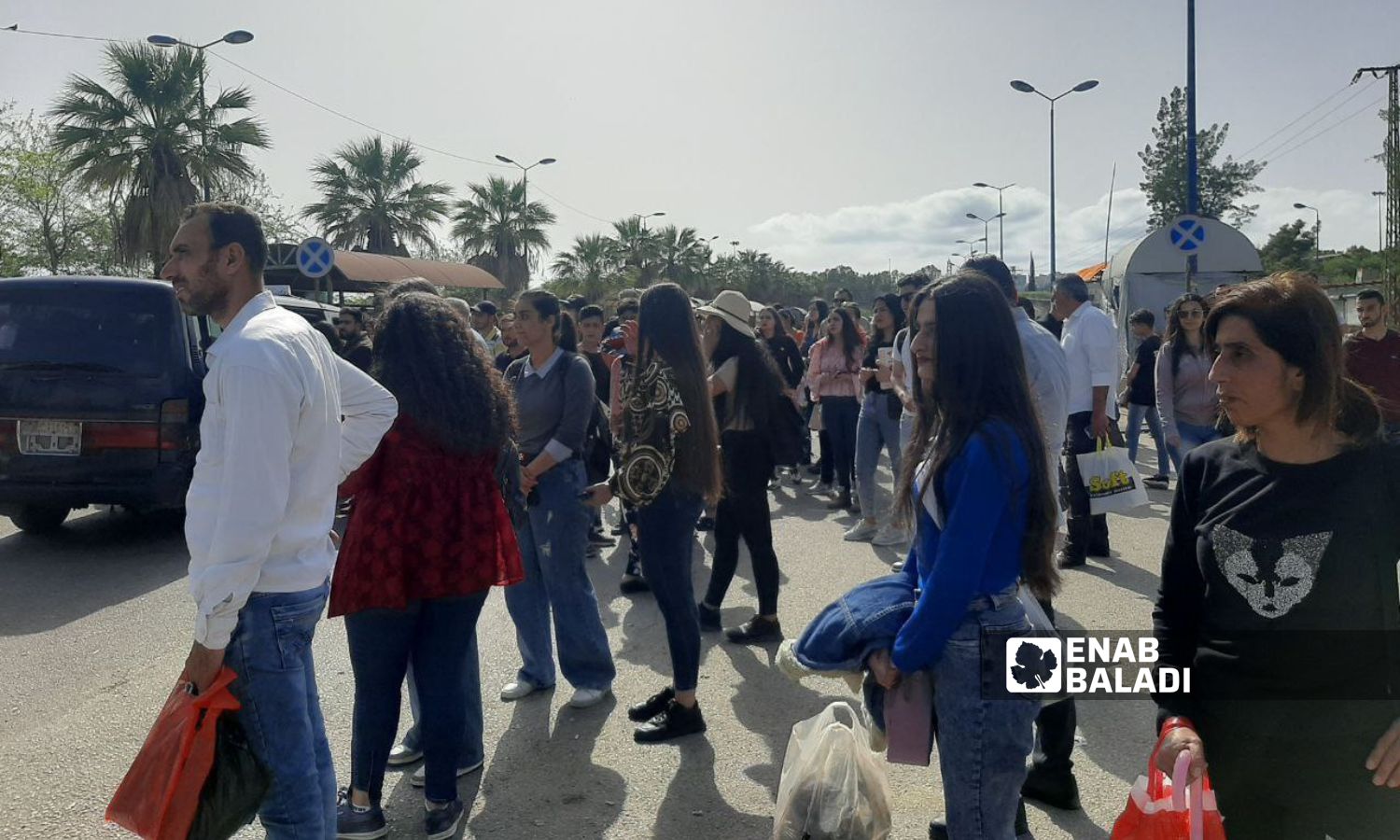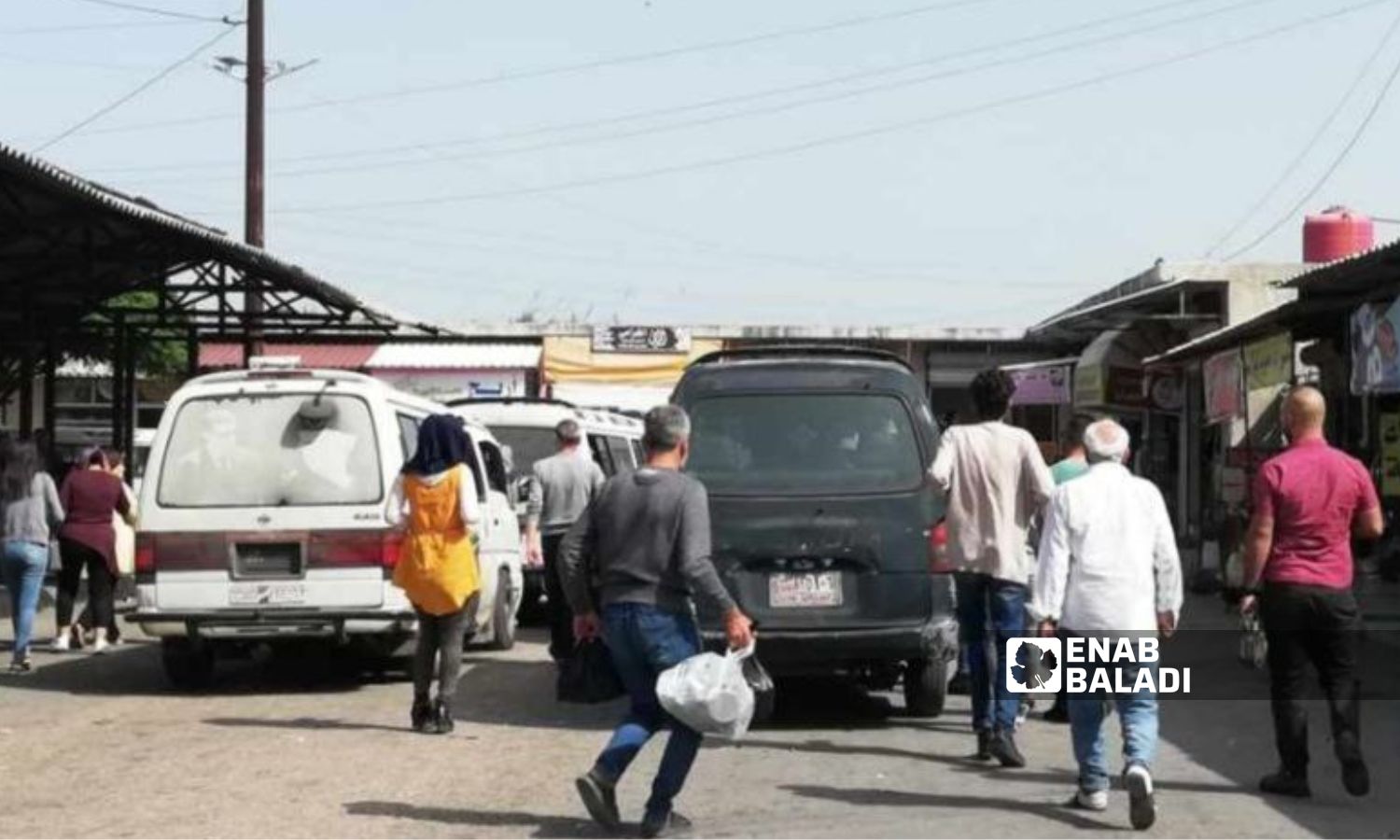



Latakia – Linda Ali
Latakia is currently experiencing a severe transportation crisis following the governorate’s announcement to reduce fuel allocations for drivers. Although the reduction has not yet been implemented, the announcement has already led to fare hikes and turmoil, according to drivers interviewed by Enab Baladi.
On April 23, Fatima, aged 22, spent over an hour and fifteen minutes racing to catch buses at the Jableh bus station. She eventually managed to squeeze herself and three others into a seat barely big enough for three.
Fatima, who was heading to Tishreen University where she studies, faced similar difficulties on her return journey. She struggled to find a small space on a bus near Draj Hospital in Latakia, where buses from Jableh to Latakia are stationed.
On April 21, the Latakia governorate announced a reduction in the province’s diesel and gasoline quotas, leading to a 25% reduction in public transportation fuel provisions and a temporary suspension of supply on Fridays.
Three drivers operating on routes within Latakia, as well as Jableh and Haffeh lines, told Enab Baladi that diesel quotas have not decreased and remain the same for all lines: 34 liters for the Saqoubin line, 31 liters for the Haffeh line, and 46 liters for the Qardaha line.
These drivers stated they expect cuts to be implemented soon but mentioned that many drivers have exploited the governorate’s announcement to overcharge passengers under this pretext.
Following the announcement, the price of diesel in the black market surged immediately, reaching 18,000 Syrian pounds per liter.

People running to reserve a seat on buses in Jableh bus station in Latakia – April 23, 2024 (Enab Baladi/Linda Ali)
On the afternoon of Tuesday, April 23, private sector employee Susan, 39, waited about 45 minutes near the post office in Jableh city. Unable to find any bus, she resorted to taking a taxi to the bus station, costing her 20,000 Syrian pounds for a mere 3.5-kilometer distance.
According to Susan, conditions at the bus station were extremely difficult, describing it as “people were heaps”, and the space couldn’t accommodate everyone, forcing dozens to wait outside for buses heading to rural areas.
Despite passengers offering to pay three times the usual fare, drivers refused, Susan noted, without knowing why.
The price of transportation fuel rose from 700 pounds per liter to 2,000 pounds in August 2023, subsequently doubling bus fares.
The situation is similar inside Latakia, which also suffers from severe transportation issues and heavy congestion, especially on routes like the Northern Ring, Qneines, and Prison Neighborhood, as well as suburban buses such as those to Mashirfeh, Saqoubin and Baksa, as well as crowded people in Farrous and eastern stations, as well as on roads waiting for buses.
Ahmed, a 21-year-old engineering student at Tishreen University, mentioned that he wasted over four hours during the last two days commuting to and from his home in Kirsana to the university. He expressed his dislike for university days and wished he could take a long break until the government addresses the fuel crisis.
Most Syrians believe that the fuel crises are manufactured to justify subsequent price hikes. Despite ongoing increases in gasoline prices, the price of diesel, crucial for public transport used by the poorer segments, remains stable but its increase seems inevitable, requiring a preparatory process.
As of Wednesday, April 24, the Ministry of Oil has not officially announced any reduction in gasoline and diesel allocations, yet local news site “Athr Press” cited sources confirming varying degrees of fuel allocation cuts across provinces including Damascus, Deir Ezzor, Homs, and Aleppo.
The waiting period for taxi fuel quotas remains unknown, while Ali, a fifty-year-old who transports fruits and vegetables, said he receives his quota message every ten days without delay despite concerns of potential postponements.
The minimum government salary in regime-controlled areas stands at about 279,000 Syrian pounds, with the US dollar equivalent to 14,900 Syrian pounds.
The average cost of living for a Syrian family of five has risen to approximately 12.5 million Syrian pounds, with a minimum of 7.8 million Syrian pounds.
if you think the article contain wrong information or you have additional details Send Correction